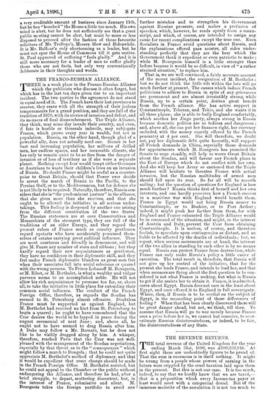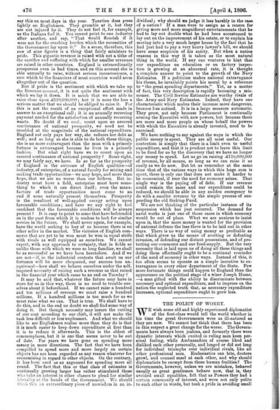THE REVENUE RETURNS. T HE total revenue of the United Kingdom
for the year ending March 31st, 1896, was £109,339,946. At first sight these are undoubtedly figures to be proud of. That the sum is enormous is in itself nothing. It might be wrung from a people whose powers of earning in the future were crippled by the cruel taxation laid upon them in the present. But this is not our case. It is too much, indeed, to say that we hardly know that we are taxed,— that is a proposition which every Income-tax payer at least would meet with a categorical denial. But of the immense majority of the population it is not too much to say this on most days in the year. Taxation does press lightly on Englishmen. They grumble at it, but they are not injured by it. They do not feel it, for example, as the Italians feel it. You cannot point to one industry after another, and say, " That would flourish if it were not for the crushing burden which the necessities of the Government lay upon it." In a sense, therefore, this row of nine figures is a thing that fairly ministers to pride. This gigantic revenue is raised with not a tithe of the sacrifice and suffering with which far smaller revenues are raised in other countries. England is extraordinarily prosperous even in bad times, and on this account she is able annually to raise, without serious inconvenience, a sum which to the financiers of most countries would seem altogether out of the question.
But if pride is the sentiment with which we take up the Revenue account, it is not quite the sentiment with which we lay it down. It is much that we are able to raise close upon £110,000,000; but it is none the less a serious matter that we should be obliged to raise it. For this is not the result of an exceptional effort made in answer to an exceptional call ; it is an annually recurring payment needed for the satisfaction of annually recurring wants. No doubt if we coul– count upon an assured continuance of national prosperity, we need not be troubled at the magnitude of the national expenditure. England not only pays her way, she reduces her debt as well ; and so long as she is able to do both these things, she is no more extravagant than the man with a princely fortune is extravagant because he lives in a princely fashion. But what right have we to count upon an assured continuance of national prosperity ? Some right, we may fairly say, we have. In so far as the prosperity of England is the outcome of English qualities—of industry, of enterprise, of a natural faculty for seizing and making trade opportunities—we may hope, and more than hope, that we are no worse than our fathers. But in- dustry must have a field, enterprise must have some- thing to which it can direct itself; even the manu- facture of trade opportunities must come to an end if none naturally present themselves. Prosperity is the resultant of well-applied energy acting upon favourable conditions ; and have we any right to feel confident that the favourable conditions will be always present ? It is easy to point to some that have befriended us in the past from which it is useless to look for similar service in the future. We shall never again, for example, have the world seeking to buy of us because there is no other seller in the market. The victories of English com- merce that are yet to be won must be won in equal strife with rivals as well equipped as ourselves. We cannot expect, with any approach to certainty, that in fields so unlike those with which we were so long familiar, we shall he as successful as we have been heretofore. And if we are not—if, in the industrial contests that await us our fortunes will be more chequered, our success less un- equivocal—how shall we behave ourselves under the self- imposed necessity of raising such a revenue as that raised in the financial year which came to an end on Tuesday ?
It may be said that, whatever the future may have in store for us in this way, there is no need to trouble our- selves about it beforehand. If we cannot raise a hundred and ten millions of revenue we must raise a hundred millions. If a hundred millions is too much for us we must raise what we can. That is true. We shall have to do this, and in the end no doubt we shall find some way of doing it. But though necessity may insure the cutting of our coat according to our cloth, it will not make the task less difficult or less unpleasant. And what we should like to see Englishmen realise more than they do is that it is much easier to keep down expenditure at first than it is to reduce it afterwards. This is the oldest of commonplaces, but it is one that seems never to be out of date. For years we have gone on spending more money in more directions. The fact that we have been compelled to spend more and more largely on certain objects has not been regarded as any reason whatever for economising in regard to other objects. On the contrary, it has been used as an argument for spending more all round. The fact that this or that class of estimates is continually growing larger has rather stimulated those who take an interest in other classes to plead for similar liberality at the hands of the Government. We should think this an extraordinary piece of unwisdom in an in- dividual ; why should we judge it less harshly in the case of a nation ? If a man were to assign as a reason for giving more and more magnificent entertainments that he had to lay out double what he had been accustomed to lay out on the improvement of his estate, or to explain his moving into a very much larger house by the fact that he had just had to pay a very heavy lawyer's bill, we should have some suspicion of his sanity. But when a nation reasons in this way it is taken as the most natural thing in the world. If any one ventures to hint that our expenditure on education or on factory inspec- tion is growing at an abnormal rate, it is thought a complete answer to point to the growth of the Navy Estimates. If a politician makes national extravagance his theme, he invariably points his moral by a reference to " the great spending departments." Yet, as a matter of fact, this very description is rapidly becoming a mis- nomer. The Civil Service Estimates are worthy rivals of the Army and Navy Estimates. Indeed, they have one characteristic which makes their increase more dangerous, because less noticed. It is in a large measure automatic. They grow, not only because Parliament is continually arming the Executive with new powers, but because there are more and more people on whose behalf the powers with which the Executive is already invested, need to be exercised.
We have nothing to say against the ways in which the public money is spent. They are all most useful. Our contention is simply that there is a limit even to useful expenditure, and that it is prudent not to leave this limit to be fixed for us by the discovery that we have no longer any money to spend. Let us go on raising £110,000,000 of revenue, by all means, so long as we can raise it as easily as we do now. But let us remember at the same time that of the various ways in which this huge sum is spent, there is only one that does not make it harder to be economical, if ever the need for economy arises. That single way is the paying off of debt. If our revenue could remain the same and our expenditure could be reduced, we should be able in any sudden emergency to do with a smaller revenue by the simple process of sus- pending the old Sinking-Fund. We are not thinking of the particular instance of its suspension which has just occurred. The demand for naval works is just one of those cases in which economy would be out of place. What we are anxious to insist upon is, that the more money is wanted for the provision of national defence the less there is to be laid out in other ways. There is no way of using money so profitable as that which gives us the means of averting or defeating invasion, of defending our distant possessions, and of pro- tecting our commerce and our food-supply. But the very necessity that is laid upon us of doing all these things and doing them effectually ought to be a continual reminder of the need of economy in other ways. Instead of this, it too often seems to operate as a simple incentive to ex- travagance in every other department of the State. Few more fortunate things could happen to England than the appearance on the political stage of a wiser Joseph Hume, —a man gifted with the ability to discriminate between necessary and optional expenditure, and to impress on the nation the neglected truth that, as necessary expenditure increases, optional expenditure ought to grow less.



































 Previous page
Previous page